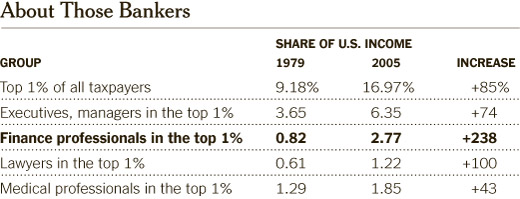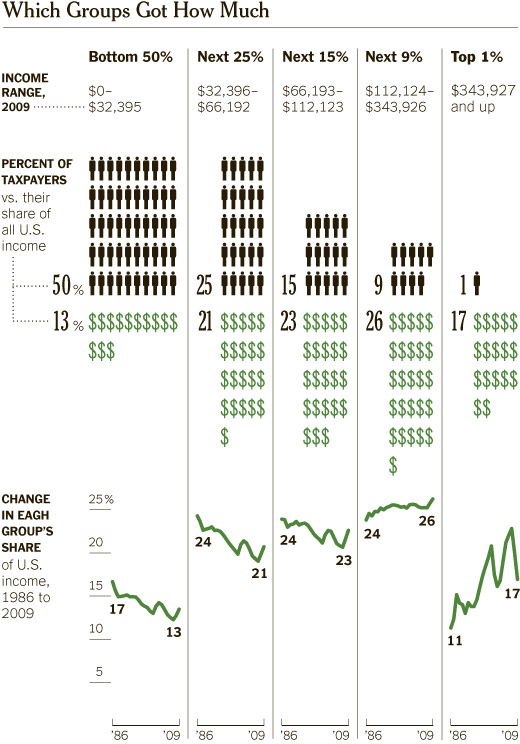Closer to the epicenter, the mission is clearer and public support even stronger. A Quinnipiac poll of New York City voters released this week found that nearly three-quarters said that they understood the protesters’ views at least fairly well, two-thirds said that they agreed with those views, nearly 9 in 10 said that it was O.K. “that they are protesting” and nearly three-quarters said that as long as the protesters obey the laws that they should be able to remain as long as they wish.
Source: "Occupy-apalooza Strikes a Chord" By CHARLES M. BLOW - NY Times - October 21, 2011
In a recent New York Times/CBS News poll, 69 percent of respondents said that Republican policies favored the rich. Twenty-eight percent said the same of Mr. Obama’s policies, while only 23 percent thought his policies favored the middle class. Sixty-six percent said the country’s distribution of wealth should be more even.
Source: "Presidential Candidates? Few Are the 99 Percent " By SHAILA DEWAN - NY Times - October 28, 2011
The top 1 percent’s share of the nation’s total adjusted gross income was 17 percent in 2009, {…}more than the entire bottom half of the population.
Since the mid-1980s the top 10 percent of Americans have increased their share at the expense of everybody else. But the lion’s share of these gains accrued to the richest 1 percent; and half of those gains went to the top 0.1 percent.
[F]rom the ’80s on, administrations from both parties embraced deregulation, undoing many of the rules put in place in the wake of the Great Depression to limit banks’ riskiest, and most lucrative, investments. Gone were the limits on interstate banking, down came the wall separating commercial and investment banks.
From 1979 to 2006, the financial industry’s share in the nation’s corporate profits grew from a fifth to almost a third. By 2006, bankers and insurers were making 70 percent more, on average, than workers in the rest of the private sector. Then they set off one of the worst financial crises in living memory, and taxpayers bailed them out.
Source: "Wall Street Protesters Hit the Bull’s-Eye" By EDUARDO PORTER - NY Times - October 29, 2011
Capitalism is so successful an economic system partly because of an internal discipline that allows for loss and even bankruptcy. It’s the possibility of failure that creates the opportunity for triumph. Yet many of America’s major banks are too big to fail, so they can privatize profits while socializing risk.
The upshot is that financial institutions boost leverage in search of supersize profits and bonuses. Banks pretend that risk is eliminated because it’s securitized. Rating agencies accept money to issue an imprimatur that turns out to be meaningless. The system teeters, and then the taxpayer rushes in to bail bankers out. Where’s the accountability?
“You cannot be a good house in a rapidly deteriorating neighborhood,” [ Mohamed El-Erian, another pillar of the financial world who is the chief executive of Pimco] told me. “The credibility and the fair functioning of the neighborhood matter a great deal. Without that, the integrity of the capitalist system will weaken further.”
So, yes, we face a threat to our capitalist system. But it’s not coming from half-naked anarchists manning the barricades at Occupy Wall Street protests. Rather, it comes from pinstriped apologists for a financial system that glides along without enough of the discipline of failure and that produces soaring inequality, socialist bank bailouts and unaccountable executives.
Source: "Crony Capitalism Comes Home" By NICHOLAS D. KRISTOF - NY Times - October 26, 2011
Our financial industry has grown so large and rich it has corrupted our real institutions through political donations. As Senator Richard Durbin, an Illinois Democrat, bluntly said in a 2009 radio interview, despite having caused this crisis, these same financial firms “are still the most powerful lobby on Capitol Hill. And they, frankly, own the place.”
Our Congress today is a forum for legalized bribery. One consumer group using information from Opensecrets.org calculates that the financial services industry, including real estate, spent $2.3 billion on federal campaign contributions from 1990 to 2010, which was more than the health care, energy, defense, agriculture and transportation industries combined. Why are there 61 members on the House Committee on Financial Services? So many congressmen want to be in a position to sell votes to Wall Street.
We can’t afford this any longer. We need to focus on four reforms that don’t require new bureaucracies to implement. 1) If a bank is too big to fail, it is too big and needs to be broken up. We can’t risk another trillion-dollar bailout. 2) If your bank’s deposits are federally insured by U.S. taxpayers, you can’t do any proprietary trading with those deposits — period. 3) Derivatives have to be traded on transparent exchanges where we can see if another A.I.G. is building up enormous risk. 4) Finally, an idea from the blogosphere: U.S. congressmen should have to dress like Nascar drivers and wear the logos of all the banks, investment banks, insurance companies and real estate firms that they’re taking money from. The public needs to know.
Source: "Did You Hear the One About the Bankers?" By THOMAS L. FRIEDMAN - NY Times - October 29, 2011

Source: NY Times - 10/30/11

Source: NY Times - 10/30/11